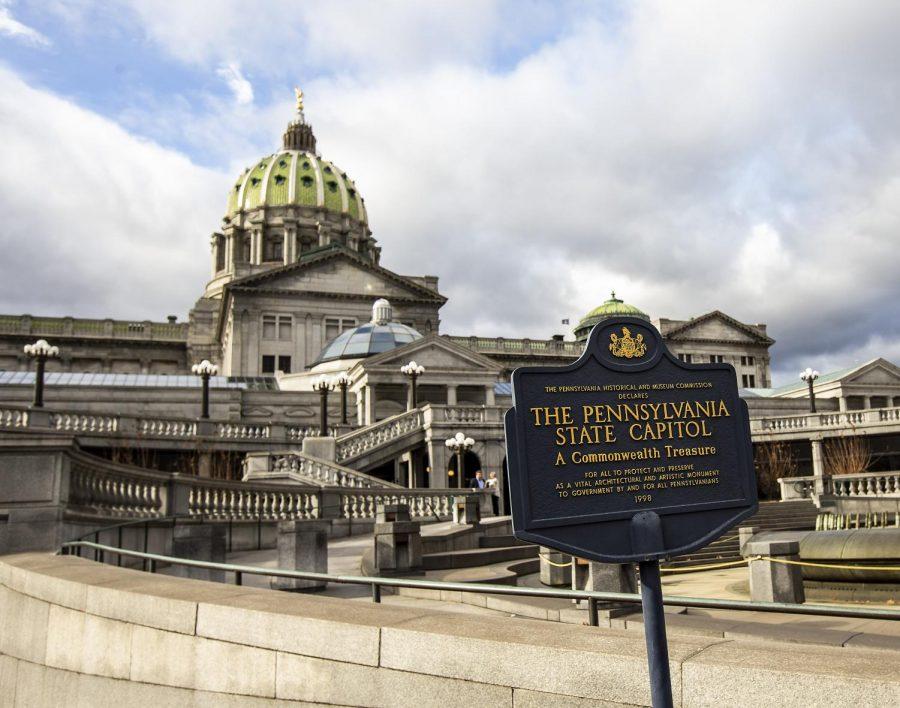Opinion | The relationship between state system, state-related universities and the Pennsylvania legislature is toxic
Image via Vicki Vellios Briner, Pennlive.com, TNS
The Pennsylvania State Capitol in Harrisburg.
September 1, 2021
Are you there God? It’s me, India. I’m fed up with the Pennsylvania state legislature again.
Many of us experienced an altered version of college these past 18 months. We’ve observed some of our schools’ shortcomings in the face of a crisis. We’ve seen just how easily standards and practices we accepted as gospel could be eliminated, such as the widespread removal of SAT/ACT requirements. We’ve taken a leap of faith and moved away from home during a pandemic, trusting that our university will do all it can to keep us safe.
But a problem arose as conversations turned to the intersection of public health and funding — the state legislature’s toxic relationship with the state system and state-related universities. Both the Pennsylvania House of Representatives and Senate have a Republican majority. Subsequently, the decisions coming out of Harrisburg have not been in favor of mask or vaccine mandates.
State Senate Republicans proposed legislation in May that would cut funding to state-funded universities who required proof of COVID-19 vaccinations to attend in-person classes or events. It originated as a call to ban “vaccine passports” to enter college campuses, but soon snowballed into a bill that restricted the state government’s authority during public health crises.
An amendment added later would have prevented Pennsylvania’s secretary of health from ordering closures, social distancing, face masks, quarantines or even hygiene practices. Gov. Tom Wolf said at the time that it was “probably a little far” to prohibit the health secretary from telling people to wash their hands.
The bill passed in both the House and Senate along party lines, but Wolf vetoed it. So, once again, Wolf’s veto power is single handedly holding this state together. But there is still a possibility of similar legislation emerging or retaliatory efforts, such as funding cuts, against public institutions who choose to mandate vaccines.
Since then, state-related universities such as Temple, Penn State and Pitt have grappled with what to do. Money from the state makes up about 7% of Pitt’s budget, 14% of Temple’s budget and 4.2% of Penn State’s budget.
Despite both Pitt’s Faculty Assembly and Senate Council voting in favor of a vaccine mandate this spring, Pitt announced this summer it would not be mandating proof of a vaccine. Instead, incentives were raffled off to those who voluntarily disclosed their vaccine status, such as tickets to sporting events or cash prizes.
Other Pittsburgh universities, such as Duquesne and Carnegie Mellon, which are both private, are requiring COVID-19 vaccines. Currently, over three-quarters of Pitt undergraduate students uploaded proof of vaccination, but it is still important to take every precaution as Allegheny County cases are on an upward trend.
This is not the first clash over funding Pitt has had with the state legislature, either. Members of the House Health Committee raised concerns over Pitt’s research, including work done with stem cells.
Another state-related school made a different decision. Temple announced it would be mandating vaccines on Aug. 13. A letter addressed to the school community stated that students will be required to receive their first dose by Sept. 10 and their second by Oct. 1. It came on the heels of directions from the Philadelphia Board of Health that all college students and healthcare workers in the city had to be fully vaccinated by Oct. 15.
Penn State’s administration decided not to mandate vaccines for the fall semester and instead opted for incentivizing vaccine disclosure. Students, faculty and community members have protested this by holding multiple rallies. In a letter published Aug. 12, President Eric Barron admitted that the decision was partially based on state funding.
He wrote about how responses to the pandemic have been met with controversy, and that they “reflect state-level political realities.” He also discussed that the university’s funding requires a two-thirds vote of the Pennsylvania legislature, meaning it “relies on strong bipartisan support.”
Jake Corman, president pro tempore of the State Senate, responded to the letter by saying he believed Penn State would likely face “pushback in Harrisburg” if it mandated vaccines.
The situation is even more dire for the 14 schools within Pennsylvania’s State System of Higher Education, which are fully state owned. Instead of just potential cuts to state funding, these schools’ leaders said they need direct legislative approval to mandate COVID-19 vaccinations, the precedent being a 2002 law that required college students to get a meningitis shot.
Michael Driscoll, Indiana University of Pennsylvania president and PASSHE Presidents Commision chair said that, for state schools, requiring vaccines is not a question of funding but authority.
That being said — we’re in deep. The lines between funding and authority, public and state institutions are blurred. GOP leaders are still gesticulating about individual freedom and privacy even as thousands of COVID-19 cases are reported each day in the state, and we have a solution available to us.
So I ask Republicans in the state legislature — can you grow up? So many students did, much faster than we should’ve had to this year. We stayed isolated in our dorms, missing out on milestones and having difficulty making friends. We lived in fear of our loved ones getting sick. Now that we’re back on campus, we know that not all of us will be responsible. And after all that, you are attempting to manipulate universities’ abilities to mandate vaccines.
The FDA approved the Pfizer vaccine. Stop the bullying and stop the threats, Harrisburg Republicans. And let universities protect their communities.
India writes primarily about politics for The Pitt News. Write to her at [email protected] or follow her on Twitter @indialarson_.









